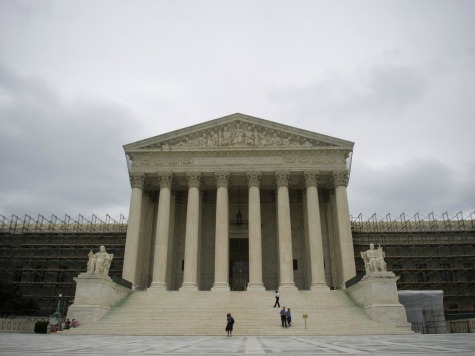On Thursday, the Supreme Court announced its calendar of cases for the first two months of its annual term, including four major cases that are sure to gather headlines.
By federal law, the Supreme Court’s term each year begins on the first Monday in October, and continues until the justices finish their business on the year’s cases, which typically happens in the last week of June of the following calendar year.
The Court hears close to 80 cases each year. Earlier this year the justices accepted 45 cases thus far for their upcoming term, which begins Oct. 7. Almost half of the remaining slots will be filled during the pre-term conference on Sept. 30. The final slots are then filled during closed-door weekly conferences on each Friday during the early months of the Court’s Term.
Of the 45 cases already granted review, four exceptionally-important ones have now been assigned an argument date.
On Oct. 8, the Court will hear arguments in McCutcheon v. FEC, the first major follow-up case to the 2010 landmark decision in Citizens United v. FEC. In McCutcheon, the Court will consider whether the federal law provisions limiting how much money American citizens can donate every two years to national political parties and non-candidate committees violate the First Amendment. Congress began imposing these limits in 1971.
The following week, on Oct. 15, the Court will hear a major race-issues case. In Schuette v. Coalition to Defend Affirmative Action, the justices will consider whether the Fourteenth Amendment Equal Protection Clause forbids a state from amending its state constitution to say that government shall not consider a person’s race when making decisions. Otherwise put, the Court will consider whether there is a constitutional right to require states to consider race.
On Nov. 5, the justices will hear Bond v. U.S., the second time Carol Anne Bond has been before the Court, represented by Supreme Court superstar Paul Clement. (The previous case, also argued by Clement, dealt solely with a jurisdictional issue.) The question presented this time in Bond II is whether the Treaty Clause of the Constitution expands Congress’ power when it is implementing a treaty to make laws or apply them in a manner that would otherwise be beyond Congress’ authority under Article I of the Constitution.
And the following day, Nov. 6, the Supreme Court will hear the biggest religious-liberty case in years. In Town of Greece v. Galloway, the justices will consider the constitutionality of prayers offered at legislative sessions, and specifically whether the Court’s precedent on this issue requires that the prayers not include language specific to one faith.
This case is especially important because the Court may revisit a quarter-century of problematic precedent, reconsidering whether the First Amendment’s Establishment Clause is violated when government actions give the impression that the government is endorsing religion, and instead is only violated when people are being coerced to support religion or participate in a religious exercise.
In September the Court will release additional argument dates for cases.
Breitbart News legal columnist Ken Klukowski is on faculty at Liberty University School of Law. Follow him on Twitter @kenklukowski.

COMMENTS
Please let us know if you're having issues with commenting.